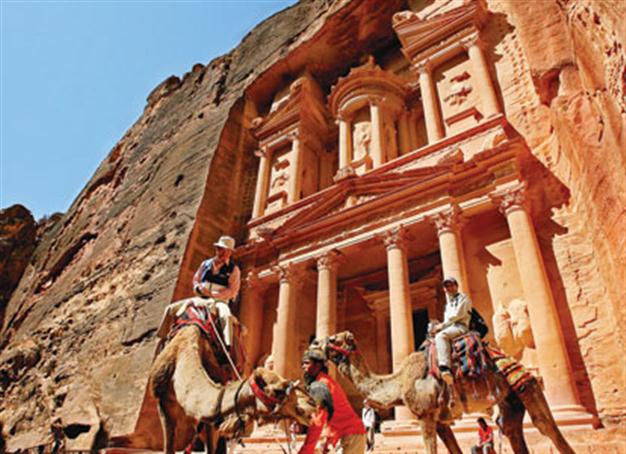Turkish tourism gains as revolts hit Arab countries
ANKARA - Agence France-Presse

This file photo shows tourists riding camels in Jordan’s Nabataean rock city of Petra. Revolts across the Arab world are taking their toll on tourism in the country
The number of Arab tourists visiting Turkey has dramatically increased during recent years, making the country a favorite destination in the Arab world, while tourism figures for one-time popular Arab destinations such as Jordan and Egypt have plunged sharply.
The number of Israeli tourists visiting Turkey has also continued to decrease due to the tense political relations between the two countries, official data showed. Only 61,950 Israeli citizens visited Turkey in the period from January to August this year, amounting to a 27 percent decrease compared to the same period in 2010, according to statistics from the Turkish Tourism Ministry.
“The figure is destined to be down further for the remaining months,” analyst Esen Çağlar of the Ankara-based Economic Policy Research Institute said. “Tensions with Israel on the political front hit the tourism sector and defense industry,” he added.
Hasan Akçakayalıoğlu, vice president of the Turkish-Israeli business council, said that “the drastic decrease in Israeli tourist numbers is directly linked with the political crisis between the two countries.”
The number of Israeli tourists visiting Turkey dropped nearly 60 percent from 2009 as the country’s total tourism figures keep on rising.
Some 1.4 million Arab tourists visited Turkey in the period from January to August this year, up from 1.2 million in the same period in 2010 and nearly 912,000 in 2009.
“We expect to reach 1.7 million Arab tourists in 2011,” said Mehmet Habbab, head of the Turkish-Lebanese Business Council.
The popular revolt in Egypt that ousted leader Hosni Mubarak and the ongoing crackdown on opponents in Syria shifted tourists to Turkey, he said, also pointing to Turkey’s increasing daily charter flights to Middle Eastern countries.
Regional effect
Popular revolts across the Arab world are also taking their toll on tourism in cash-strapped Jordan, where revenues from the key source of hard currency earnings have dropped by 16 percent this year.
Tourism generated $3 billion last year, with 4.8 million tourists visiting attractions such as the Nabataean rock city of Petra, the Roman town of Jerash, the Dead Sea – the lowest point on earth – and the Red Sea resort of Aqaba.
There have been some protests in Jordan, but the country has been relatively quiet compared to the unrest in other parts of the Middle East, which has frightened off travelers this year.
“The Arab Spring has negatively affected the tourism industry in Jordan,” Shaher Hamdan, head of Jordan Society of Tourism and Travel Agents, told AFP.
“Travel agents’ income has significantly dropped by around 90 percent in 2011 compared to last year,” Hamdan said, adding that 70 percent of travel tours and trips from Europe have been cancelled this year.
“We used to have joint tourism programs with Egypt and Syria, but instability in the two countries has affected us,” he added.
Tourism, which contributes 14 percent to the gross domestic product, and bank transfers from Jordanians working abroad are the top sources of hard currency earnings in the kingdom of nearly 6.5 million people.
















